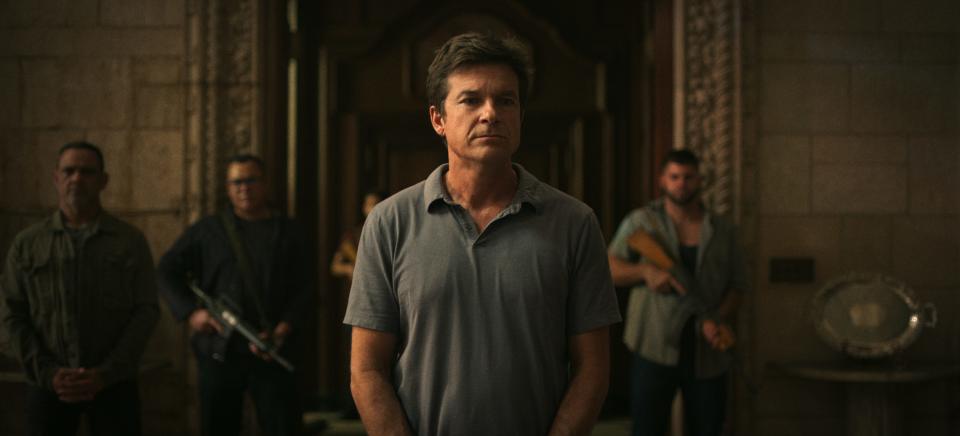To lure next 'Gone Girl' to Missouri, lawmakers consider tax credits for TV, movies
JEFFERSON CITY — State lawmakers are considering subsidies directed at the film, TV and live entertainment industries to lure big-budget productions to Missouri.
A slate of proposals, heard Monday by a Senate committee, would provide incentives for studios and production companies to film on location in the Show-Me State, as well as hold rehearsals and live performances within the state.
Similar tax credits have been proposed in previous sessions, though they have failed to make it to the governor's desk. A previous Missouri program providing tax credits to the film and entertainment industries expired back in 2013.

Four senators, two Republicans and two Democrats, are sponsoring tax credit programs for expenses racked up during the production of film and television projects, ranging from 20% to 25%. Companies could earn an additional 5% in credits if they film the majority of the film within Missouri, film a certain portion in a rural region, hire Missouri residents to work on set, or include a script that the state determines "positively markets a city or region of the state."
"We've had no major film projects filmed in the state of Missouri (since 2013)," said Sen. Denny Hoskins, a Warrensburg Republican sponsoring one version of the legislation.
Live updates:Missouri legislature continues focus on schools, trans youth this week
Two other proposals are directed toward live entertainment events. Senate Bills 170 and 94, sponsored by a Republican and Democrat, would reimburse 30% of expenses for rehearsal and tour expenses. The credits are not refundable but can be transferred or sold, and the total amount of tax credits awarded annually can't exceed $8 million.
People within the industry urged lawmakers to pass the measures, which they said could open a path for a new workforce to emerge in the state. They could also funnel money into already established businesses and regions. Cole Payne, a filmmaker who said he helped to craft the legislation, said at a recent feature film production in Kentucky, he hired 12 off-duty police officers, six firemen and five EMTs, as well as rented an old church.
"There's all kinds of income tax that's coming out of this, not just production," Payne said. "It touches so many small businesses and so many areas."
Steph Shannon, the director of the Kansas City Film Office and KC Film Commissioner, said the first thing production companies ask about when pitched on Missouri is "what are your incentives" — which are currently enough to attract commercial and small-project work, she said, but not enough to seal the deal on the next "Gone Girl."
"We just don't have the level of industry that we deserve, that puts on screens around the world often, and gets our workforce working at a good wage, all the time," Shannon said.
She said the state had lost out on an estimated $800 million in direct spending since 2017 from projects that are set in Missouri but did not film in Missouri — including the TV series "Ozark," "Sharp Objects," season 4 of "Fargo," and "The OA." Shannon had recently pitched to a scripted series airing on Hulu, and asked lawmakers to move with urgency to give the state a leg up and the chance to lock down the opportunity.
Critics of the proposals have included several lawmakers who rank among the more conservative members of the legislature, as well as libertarian policy groups and think tanks.
Missouri legislature:Proposed bills target dead deer littering state roads and highways
Americans for Prosperity for Missouri, one of those think tanks, testified against the proposals Monday, arguing that the program would play favorites and asked lawmakers to prioritize policies that benefited "all businesses."
The tax credit programs would expire between 2029 and 2031, depending on the specific version of the legislation. Shannon urged lawmakers to adopt an expiration date "that makes sense" to allow the industry to get footing within Missouri.
"We can establish infrastructure ... but that can only happen if investors trust there will be a flow of work," she said.
Similar proposals will be heard Wednesday morning in the House. The Senate committee did not take a vote on the legislation; if they approve the bills next week, they will head to the full chamber for debate.
Galen Bacharier covers Missouri politics & government for the News-Leader. Contact him at gbacharier@news-leader.com, (573) 219-7440 or on Twitter @galenbacharier.
This article originally appeared on Springfield News-Leader: Tax credits for TV, movies & concerts weighed by Missouri legislature

